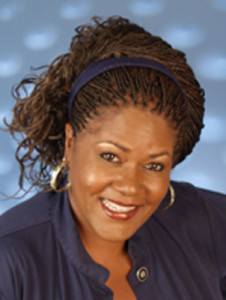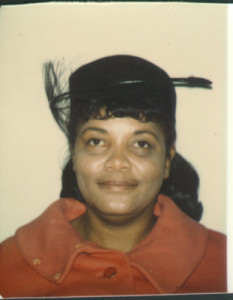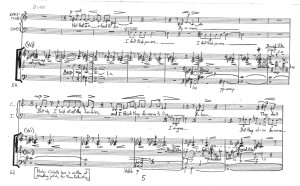 It has been three years since I first wrote about my idea for a Jonestown-related opera. As any reader of the jonestown report arts section knows, many people have already dreamed up artistic projects which examine and interpret Peoples Temple and Jonestown, and continue to do so now. This is a great thing, and I’m proud to be in their company! The focus of my project is Christine Miller, the brave woman who spoke up on November 18, 1978, in a final effort to convince Jim Jones and her fellow residents that there was a better way than mass death to solve their predicament. Early parts of the opera will introduce Christine’s independent streak, and summarize the lead-up to
It has been three years since I first wrote about my idea for a Jonestown-related opera. As any reader of the jonestown report arts section knows, many people have already dreamed up artistic projects which examine and interpret Peoples Temple and Jonestown, and continue to do so now. This is a great thing, and I’m proud to be in their company! The focus of my project is Christine Miller, the brave woman who spoke up on November 18, 1978, in a final effort to convince Jim Jones and her fellow residents that there was a better way than mass death to solve their predicament. Early parts of the opera will introduce Christine’s independent streak, and summarize the lead-up to

California Historical Society.
November 1978 as seen through her eyes. The last act will focus entirely on the tragic day and will attempt to show Christine – and by extension, all the members there – rising above their physical circumstances and triumphing spiritually over the one who purported to lead them. Hold that thought!
The project is moving ahead slowly but surely, but with much excitement for me. Alas, I only get a tiny amount of creative time each month, since several jobs leading choirs occupy most of my life. But now I’m nearing completion of a chunk of the final scene, which I hope to use as bait for a full commission. Another great asset is my friend Tichina Vaughn (pictured at left), a wonderful mezzo active in Europe, who is equally turned on by the project, and for whom I’m molding the title role.
I’d like to outline how progress is going so far on the final scene fragment, then consider a few of the interesting issues and dynamics that are emerging from it.
Early on, I realized that a long, emotional scene like this required dramatic pacing that could be sustained only by trimming the text – in this case, transcripts of the so-called Death Tape – and also by portraying the huge contrasts of mood that prevailed that day. Nothing is still that afternoon: voices, emotions, actions, reactions, all shifted chaotically, without form or direction, charged by fear and confusion and adrenaline. Jones goes on multiple rants – mostly of the drug-addled variety – people are alternately reasonable, hysterical, fatalistic, angry, argumentative. Into this mix, Christine carefully chooses when to insert herself, showing a remarkably calm persistence. How does she try to convince the community? By rapid-firing an impressive array of arguments, most of them derived from Jones’ own teachings.
I’m finding that the orchestra plays a central role in guiding the audience back and forth between the extreme Jim Jones energy and the more rational Christine energy. After one Jones outburst, the orchestra explodes, extending the feel of his misguided passions, before gradually subsiding to allow the violas and harp to emerge, which gently usher in Christine’s quiet assertion that she’s not afraid to die. Movingly – as ghostly music-box notes waft by – she evokes the unfairness of making the babies suffer for Jones’ political agenda. Sensing the danger of letting the crowd digest this thought, Jones steers the conversation to their (allegedly) vain search for peace, in a soliloquy casting himself as a martyr for them. Christine, undaunted and more passionate now, argues that destroying themselves would only hand their enemies a victory.
Again, sensing that he might lose control of the situation, Jones interrupts with a torrent of paranoia about how the military will invade them if they don’t act now, a passage punctuated by volatile brass chords. Then Jim McElvane, one of Jones’ lieutenants, chimes in saying that Christine should give up, that their fate is sealed. A gospel organ accompanies him, igniting another fiery wave of ecstasy for Jones to exploit. Once again, Christine waits until the wave has subsided, then pushes on, patiently insisting that each individual there owns her own destiny. Quiet pulsations in the strings and piano underscore her. After a woman in the crowd objects to this, Christine lays it on the line in an aria asserting her belief in Peoples Temple, that they must survive to reach their full potential.
 As all this is going on, another important element has emerged: the crowd, taking the form of a mixed chorus. I’m fascinated by the reactions I hear on the Death Tape. Most of the people there agree with Jones, because, unfortunately, he had conditioned them to accept his words without question. But in Christine’s strongest moments that day, there are eerie silences, suggesting that things could turn at any second. Even though no one there spoke up in support of her, it is well documented that many Temple members and Jonestown survivors did harbor doubts about Jones’ leadership, even if they kept those doubts to themselves. In this sense I believe that Christine spoke as a proxy for all of them, including those who eventually shouted her down. How, then, to illustrate this in an opera? I’ve decided to have the chorus echo certain words and phrases sung by both Jones and Christine, during their dialogue. After Jones asks if they’ve gotten the peace they came there for, they sustain chords of “No” under his next lines. When Christine sings of not letting the enemy defeat us, they echo her words in accompaniment. When Jones rages about an impending invasion, the crowd agrees. What’s the point of this? To illustrate both their higher wisdom and the abject cruelty of Jones’ manipulation.
As all this is going on, another important element has emerged: the crowd, taking the form of a mixed chorus. I’m fascinated by the reactions I hear on the Death Tape. Most of the people there agree with Jones, because, unfortunately, he had conditioned them to accept his words without question. But in Christine’s strongest moments that day, there are eerie silences, suggesting that things could turn at any second. Even though no one there spoke up in support of her, it is well documented that many Temple members and Jonestown survivors did harbor doubts about Jones’ leadership, even if they kept those doubts to themselves. In this sense I believe that Christine spoke as a proxy for all of them, including those who eventually shouted her down. How, then, to illustrate this in an opera? I’ve decided to have the chorus echo certain words and phrases sung by both Jones and Christine, during their dialogue. After Jones asks if they’ve gotten the peace they came there for, they sustain chords of “No” under his next lines. When Christine sings of not letting the enemy defeat us, they echo her words in accompaniment. When Jones rages about an impending invasion, the crowd agrees. What’s the point of this? To illustrate both their higher wisdom and the abject cruelty of Jones’ manipulation.
This is a crucial point: the people of Jonestown deserved so much better. They’d come there to realize a shared vision of a just, equal, color-blind society, better than the world they’d left behind. Instead, through no fault of their own, they were used by a megalomaniac for his own needs. When the crowd echoes Jones’ words in this scene, I hear only a reflection of his cynical control tactics, against their will. When they echo Christine, I hear their repressed true consciences shining through, despite that control. Painful though this is to depict, I feel it must be depicted.
Scholarship on the Jim/Christine relationship, as well as the Death Tape itself, reveal a unique dynamic between them – competitive but also oddly affectionate. Things got tense sometimes, as illustrated by the infamous episode where he pulled a gun on her, but they also genuinely liked each other. I try to reflect this in the opera. Jones is knocked off his stride by her several times, and realizes he must turn the crowd against her. He knows that Christine’s outspoken nature has made her unpopular in Jonestown, so it serves his needs to let her go on. Jones transfers her strength to his own advantage. He allows her to make her points, says it’s her right to speak out, magnanimously praises her boldness, then has the crowd do the dirty work of losing patience with her. It is a disingenuous abuse of the trust that Christine and every other person there had placed in him, and it worked.
I’ve been very grateful to have several email conversations with survivors, and hope to have more as I keep working. In my correspondence with Don Beck, one theme that has emerged is the idea of misplaced trust. Nobody joined PT to commit suicide. They joined PT to create a better world. Early on, Jones personified that ideal. But at some point, things changed. As Don put it, “It’s a matter of always re-affirming our trust, i.e., being mindful to check if our trust in a person or group is still justified. If so, keep on. If not, work to challenge to bring it back to something worthy of trust … or find a new person or group.”
Don also gave me food for thought about the trust that PT members placed in each other: “The sense of community is what I miss and am reminded of when we see one another. We had it, and though the Temple ‘died,’ that sense of trust still continues as something I remember, feel and cherish. I think all of us who were in PT have a sense of that, even those who left.”
This faith in bedrock principles seems to have survived along with the people. To me, this is a powerful testimony. It suggests that those who did leave did so because of Jones’ mis-leadership, not because they’d lost sight of the uniquely personal meaning PT had for each of them. They did have their own destinies after all. Christine was right.
Don once again: “Even Christine, in searching for something else other than to die, assumes a faith in something that held us together. Something even Jones seemed to lose and be floundering in … something where in our not questioning him let him get lost in himself and lose sight of the community which had emerged through him. What he should have realized is that the rapport and trust he built in us stood better even than he did.”
I return to that thought I asked you to hold at the beginning of this piece: How will the citizens of Jonestown spiritually triumph over Jones in my opera? It’s very important to me that the end have that feel. Exactly how to get there is still under construction. But this is what I know so far: The deaths are depicted symbolically, not realistically. Stylized slow-mo descents, maybe in shadow, a soft implosion thud for Jones’ gun. No cries, no agony, though of course that did happen back then. As Christine reaches the ground, she is singing a spiritual we’ve already associated with her earlier in the work. Eventually they’re all singing it, even though “dead.” I’d love to see the platform they’re on rise above Jones, who is slumped in his chair, only dimly lit by residual light from his infamous sign, “Those who cannot remember the past are condemned to repeat it.” Perhaps, as Don has suggested, I can evoke a vision of today’s survivors continuing to manifest the good that came from Temple members. In fact, maybe the opera is bookended that way – starting and ending with survivors behind a scrim, paying tribute to their departed friends.
Beyond that, well, I’m still thinking about it.
(Perry Townsend is a composer and choir director based in New York City. He can be reached at ptownsend@immerbox.com. He would especially like to hear from anyone with ideas about possible spirituals to use in Christine’s final scene. Ideally it should be a spiritual which was actually used in Peoples Temple services, and which would be somewhat familiar to a general audience.
(A number of samples of Tichina Vaughn’s work can be found here.)